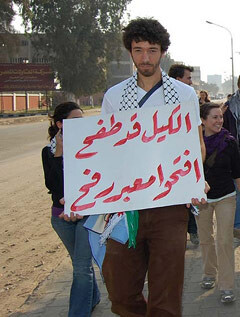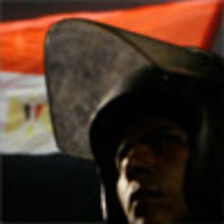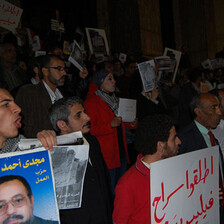The Electronic Intifada 10 February 2009

Philip Rizk marching in solidarity with Palestinians in Gaza and against the Egyptian government’s closure of the Rafah crossing. (Per Bjorklund)
Fourteen activists from a number of countries, including Egypt, Spain, the US, UK and Germany all took part in the “March to Gaza,” which was led through the Egyptian countryside on Friday with the aim of raising awareness about the ongoing siege on Gaza. Close to Kafr Hamza village north of Cairo, the group of activists and two journalists were detained on the roadside by local state security agents. They were held for four hours before being taken to the police station in Abu Sabel.
At this point the officers singled out Rizk and demanded to interrogate him inside the police station, acting apparently on direct orders from state security agents in Cairo. Rizk agreed to enter the station only on condition that he was accompanied by three human rights lawyers who had arrived from Cairo. At 11pm, state security agents from Cairo arrived and forced the lawyers to leave the interrogation room. Rizk was then smuggled out through a back door, and sped off in a microbus without license plates, almost running over Rizk’s supporters who had gathered outside the police station and tried to stop the vehicle.
After more than 48 hours there was still no official response to questions about Rizk’s whereabouts or the charges against him, although a public prosecutor in Cairo said it was “90 percent certain” that he was being held in state security facilities in Lazoghly, Cairo. At around 1:30am on Monday, armed security agents went to the home of his parents in Cairo and searched it. The same night they also broke into his apartment that he shares with his sister and took a number of items, including his camera and laptop.
Demonstrations calling for Philip’s immediate release have been held by activists, students and teachers outside the High Court in Cairo and on the American University of Cairo campus on three consecutive days since the arrest, and more protests are being planned for the coming days ahead.
Rizk is a journalist and documentary filmmaker, in the final stages of finishing his film Samoud, about peaceful resistance to Israeli occupation in Palestinian villages in the West Bank and Gaza Strip. He has lived in Gaza for two years, reporting for various international media outlets like The Electronic Intifada and Al-Jazeera English, while running the blog Tabula Gaza. Before being detained by the police, Rizk explained the purpose of the march was part of an international campaign to raise awareness about the continuing siege of Gaza, building on the momentum created by the Israeli military assault.
“As our governments fail to move to help the Palestinians, citizens around the world have no choice but to act ourselves,” Rizk said during the march.
The campaign was launched on 23 January to commemorate the border breach in Rafah on that day last year, when hundreds of thousands of Palestinian poured into Egypt to shop for badly needed supplies denied to them by the Israeli siege.
In a campaign call on the website togaza.net, citizens around the world are urged to march on Gaza to protest the siege: “Though the immediate Israeli military onslaught on Gaza — for the time being — has come to a standstill this is not a solution. Let us seize this time of urgency to act and call for an end to siege on Gaza. Though our respective governments reject expressing our resistance to the status quo we — the multitude — must move to the streets, as a collective global expression in condemnation of Israel’s actions.”
On 31 January around 15 activists in Spain responded to the call and organized a symbolic march close to Alicante, reaching the point in Spain that is closest to Gaza. Activists say another march is already being planned in Egypt, despite the arrest of Rizk.
On Friday more then 50 people were also arrested during protests called for by the Muslim Brotherhood, one of the leading opposition parties to president Mubarak’s National Democratic Party. The demonstrators demanded that Egypt permanently open the Rafah border crossing and warned Israel from invading Gaza again. Last week another political activist was also arrested from the Islamist Labor party and is being tried for visiting the Gaza Strip without a permit.
During the Israeli war on Gaza tens of thousands of Egyptians took to the streets, condemning the military assault as well as the complicity of the Mubarak government in the blockade of the strip. Hundreds were arrested during the protests.
Per Bjorklund is a freelance journalist based in Cairo since 2006, covering social protest movements and dissent in Egypt as well as events in the region.


